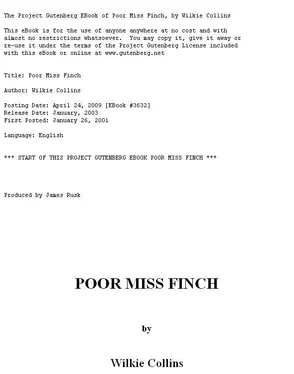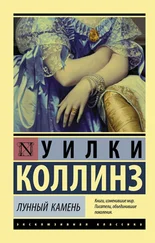Уилки Коллинз - Poor Miss Finch
Здесь есть возможность читать онлайн «Уилки Коллинз - Poor Miss Finch» весь текст электронной книги совершенно бесплатно (целиком полную версию без сокращений). В некоторых случаях можно слушать аудио, скачать через торрент в формате fb2 и присутствует краткое содержание. Год выпуска: 2002, Жанр: Классическая проза, на английском языке. Описание произведения, (предисловие) а так же отзывы посетителей доступны на портале библиотеки ЛибКат.
- Название:Poor Miss Finch
- Автор:
- Жанр:
- Год:2002
- ISBN:нет данных
- Рейтинг книги:3 / 5. Голосов: 1
-
Избранное:Добавить в избранное
- Отзывы:
-
Ваша оценка:
- 60
- 1
- 2
- 3
- 4
- 5
Poor Miss Finch: краткое содержание, описание и аннотация
Предлагаем к чтению аннотацию, описание, краткое содержание или предисловие (зависит от того, что написал сам автор книги «Poor Miss Finch»). Если вы не нашли необходимую информацию о книге — напишите в комментариях, мы постараемся отыскать её.
Poor Miss Finch — читать онлайн бесплатно полную книгу (весь текст) целиком
Ниже представлен текст книги, разбитый по страницам. Система сохранения места последней прочитанной страницы, позволяет с удобством читать онлайн бесплатно книгу «Poor Miss Finch», без необходимости каждый раз заново искать на чём Вы остановились. Поставьте закладку, и сможете в любой момент перейти на страницу, на которой закончили чтение.
Интервал:
Закладка:
The fit on this occasion was a short one. Perhaps the drug was already beginning to have some influence over him? In twenty minutes, he was able to resume his chair, and to go on talking to me.
"You think I shall horrify you when my face has turned blue," he said with a faint smile. "Don't I horrify you now when you see me in convulsions on the floor?"
I entreated him to dwell on it no more.
"God knows," I said, "you have convinced me—obstinate as I am. Let us try to think of nothing now but of the prospect of your being cured. What do you wish me to do?"
"You have great influence over Lucilla," he said. "If she expresses any curiosity, in future conversations with you, about the effect of the medicine, check her at once. Keep her as ignorant of it as she is now!"
"Why?"
"Why! If she knows what you know, how will she feel? Shocked and horrified, as you felt. What will she do? She will come straight here, and try, as you have tried, to persuade me to give it up. Is that true or not?"
(Impossible to deny that it was true.)
"I am so fond of her," he went on, "that I can refuse her nothing. She would end in making me give it up. The instant her back was turned, I should repent my own weakness, and return to the medicine. Here is a perpetual struggle in prospect, for a man who is already worn out. Is it desirable, after what you have just seen, to expose me to that?"
It would have been useless cruelty to expose him to it. How could I do otherwise than consent to make his sacrifice of himself—his necessary sacrifice—as easy as I could? At the same time, I implored him to remember one thing.
"Mind," I said, "we can never hope to keep her in ignorance of the change in you, when the change comes. Sooner or later, some one will let the secret out."
"I only want it to be concealed from her while the disfigurement of me is in progress," he answered. "When nothing she can say or do will alter it—I will tell her myself. She is so happy in the hope of my recovery! What good can be gained by telling her beforehand of the penalty that I pay for my deliverance? My ugly color will never terrify my poor darling. As for other persons, I shall not force myself on the view of the world. It is my one wish to live out of the world. The few people about me will soon get reconciled to my face. Lucilla will set them the example. She won't trouble herself long about a change in me that she can neither feel nor see."
Ought I to have warned him here of Lucilla's inveterate prejudice, and of the difficulty there might be in reconciling her to the change in him when she heard of it? I dare say I ought, I daresay I was to blame in shrinking from inflicting new anxieties and new distresses on a man who had already suffered so much. The simple truth is—I could not do it. Would you have done it? Ah, if you would, I hope I may never come in contact with you. What a horrid wretch you must be! The end of it was that I left the house—pledged to keep Lucilla in ignorance of the cost at which Oscar had determined to purchase his cure, until Oscar thought fit to enlighten her himself.
CHAPTER THE TWENTIETH
Good Papa again!
THE promise I had given did not expose me to the annoyance of being kept long on the watch against accidents. If we could pass safely over the next five days, we might feel pretty sure of the future. On the last day of the old year, Lucilla was bound by the terms of the will to go to London, and live her allotted three months under the roof of her aunt.
In the brief interval that elapsed before her departure, she twice approached the dangerous subject.
On the first occasion, she asked me if I knew what medicine Oscar was taking. I pleaded ignorance, and passed at once to other matters. On the second occasion, she advanced still further on the way to discovery of the truth. She now inquired if I had heard how the physic worked the cure. Having been already informed that the fits proceeded from a certain disordered condition of the brain, she was anxious to know whether the medical treatment was likely to affect the patient's head. This question (which I was of course unable to answer) she put to both the doctors. Already warned by Oscar, they quieted her by declaring that the process of cure acted by general means, and did not attack the head. From that moment, her curiosity was satisfied. Her mind had other objects of interest to dwell on, before she left Dimchurch. She touched on the perilous topic no more.
It was arranged that I was to accompany Lucilla to London. Oscar was to follow us, when the state of his health permitted him to take the journey. As betrothed husband of Lucilla, he had his right of entry, during her residence in her aunt's house. As for me, I was admitted at Lucilla's intercession. She declined to be separated from me for three months.
Miss Batchford wrote, most politely, to offer me a hospitable welcome during the day. She had no second spare-room at her disposal—so we settled that I was to sleep at a lodging-house in the neighborhood. In this same house, Oscar was also to be accommodated, when the doctors sanctioned his removal to London. It was now thought likely—if all went well—that the marriage might be celebrated at the end of the three months, from Miss Batchford's residence in town.
Three days before the date of Lucilla's departure, these plans—so far as I was concerned in them—were all over-thrown.
A letter from Paris reached me, with more bad news. My absence had produced the worst possible effect on good Papa.
The moment my influence had been removed, he had become perfectly unmanageable. My sisters assured me that the abominable woman from whom I had rescued him, would most certainly end in marrying him after all, unless I reappeared immediately on the scene. What was to be done? Nothing was to be done, but to fly into a rage—to grind my teeth, and throw down all my things, in the solitude of my own room—and then to go back to Paris.
Lucilla behaved charmingly. When she saw how angry and how distressed I was, she suppressed all exhibition of disappointment on her side, with the truest and kindest consideration for my feelings. "Write to me often," said the charming creature, "and come back to me as soon as you can." Her father took her to London. Two days before they left, I said good-bye at the rectory and at Browndown; and started—once more by the Newhaven and Dieppe route—for Paris.
I was in no humour (as your English saying is) to mince matters, in controlling this new outbreak on the part of my evergreen parent. I insisted on instantly removing him from Paris, and taking him on a continental tour. I was proof against his paternal embraces; I was deaf to his noble sentiments. He declared he should die on the road. When I look back at it now, I am amazed at my own cruelty. I said, "En route, Papa!"—and packed him up, and took him to Italy.
He became enamored, at intervals, now of one fair traveler and now of another, all through the journey from Paris to Rome. (Wonderful old man!) Arrived at Rome—that hotbed of the enemies of mankind—I saw my way to putting a moral extinguisher on the author of my being. The Eternal City contains three hundred and sixty-five churches, and (say) three million and sixty-five pictures. I insisted on his seeing them all—at the advanced age of seventy-five years! The sedative result followed, exactly as I had anticipated. I stupefied good Papa with churches and pictures—and then I tried him with a marble woman to begin with. He fell asleep before the Venus of the Capitol. When I saw that, I said to myself, Now he will do; Don Juan is reformed at last.
Lucilla's correspondence with me—at first cheerful—gradually assumed a desponding tone.
Six weeks had passed since her departure from Dimchurch; and still Oscar's letters held out no hope of his being able to join her in London. His recovery was advancing, but not so rapidly as his medical adviser had anticipated. It was possible—to look the worst in the face boldly—that he might not get the doctor's permission to leave Browndown before the time arrived for Lucilla's return to the rectory. In this event, he could only entreat her to be patient, and to remember that though he was gaining ground but slowly, he was still getting on. Under these circumstances, Lucilla was naturally vexed and dejected. She had never (she wrote), from her girlhood upward, spent such a miserable time with her aunt as she was spending now.
Читать дальшеИнтервал:
Закладка:
Похожие книги на «Poor Miss Finch»
Представляем Вашему вниманию похожие книги на «Poor Miss Finch» списком для выбора. Мы отобрали схожую по названию и смыслу литературу в надежде предоставить читателям больше вариантов отыскать новые, интересные, ещё непрочитанные произведения.
Обсуждение, отзывы о книге «Poor Miss Finch» и просто собственные мнения читателей. Оставьте ваши комментарии, напишите, что Вы думаете о произведении, его смысле или главных героях. Укажите что конкретно понравилось, а что нет, и почему Вы так считаете.






